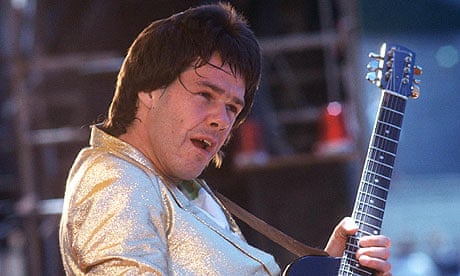When the current lineup of legendary rock band Thin Lizzy toured last month, one of the highlights was an emotional performance of Still in Love With You, their mournful ballad from 1974. The song – with vocalist Ricky Warwick filling in for Phil Lynott who died in 1986 – was presented as a tribute to Lizzy's famous fallen leader, with images of "Philo" in his 70s heyday resulting in barely a dry eye in the house. But no one could have possibly predicted that Gary Moore, the Belfast guitarist who contributed so much to the song, not least its extraordinary solo, would be dead within the month.
Moore's sudden death this weekend at the age of 58 didn't just rob music of one of Thin Lizzy's best-known former members, but a giant of modern-day guitar playing whose work stretched far beyond rock and heavy metal to pop, jazz and even techno. Inspired to pick up a guitar by Fleetwood Mac's Peter Green, Moore will be remembered as a true modern bluesmen whose ability to make a guitar seemingly cry in pain touched many. This morning, Bob Geldof positioned the guitarist/singer as part of a golden triangle of Irish blues including Van Morrison and Rory Gallagher. Moore's former bandmates have paid tribute to a "great player and a great guy". Most astonishing has been the outpouring of love and respect from ordinary people. On internet sites, Twitter and even football forums, fans have come together to honour an unpretentious, unassuming, prodigiously talented man whose soulful music one fan praised for "getting me through the bad times".
Although Moore was at school with Lynott and drummer Brian Downey, Thin Lizzy had been going for five years before Lynott recruited Moore to replace Eric Bell in 1974. Moore's first spell in the band lasted just three months, but his blistering playing on the single Little Darling took Lizzy towards the driven hard rock that made their name. Moore filled in for Robertson for a US tour in 1977, but his third spell in the group in 1979 inspired one of their greatest, most successful albums, Black Rose: A Rock Legend, featuring such classics as Waiting for An Alibi and Do Anything You Want To, before Moore quit again. His relationship with Lynott was famously fractious, but the pair united for Moore's 1979 top 10 single Parisienne Walkways (another example of Moore's melancholy blues) and 1985's harder rocking Out in the Fields.
Perhaps Moore was too much his own man to be confined to a band. He recorded over 20 solo albums, including 1990's Still Got the Blues, and worked with everyone from BB King to Bob Dylan. While recording a track called The Loner, Moore epitomised the idea of a guitar man as gunslinger, following whatever path his restless spirit demanded. A man who kept his emotions in check as much as he allowed them to pour out through his guitar, Moore once said he would like to be remembered as someone who "meant it, no bullshit". Nobody who hears his remarkable playing would ever disagree.

Comments (…)
Sign in or create your Guardian account to join the discussion